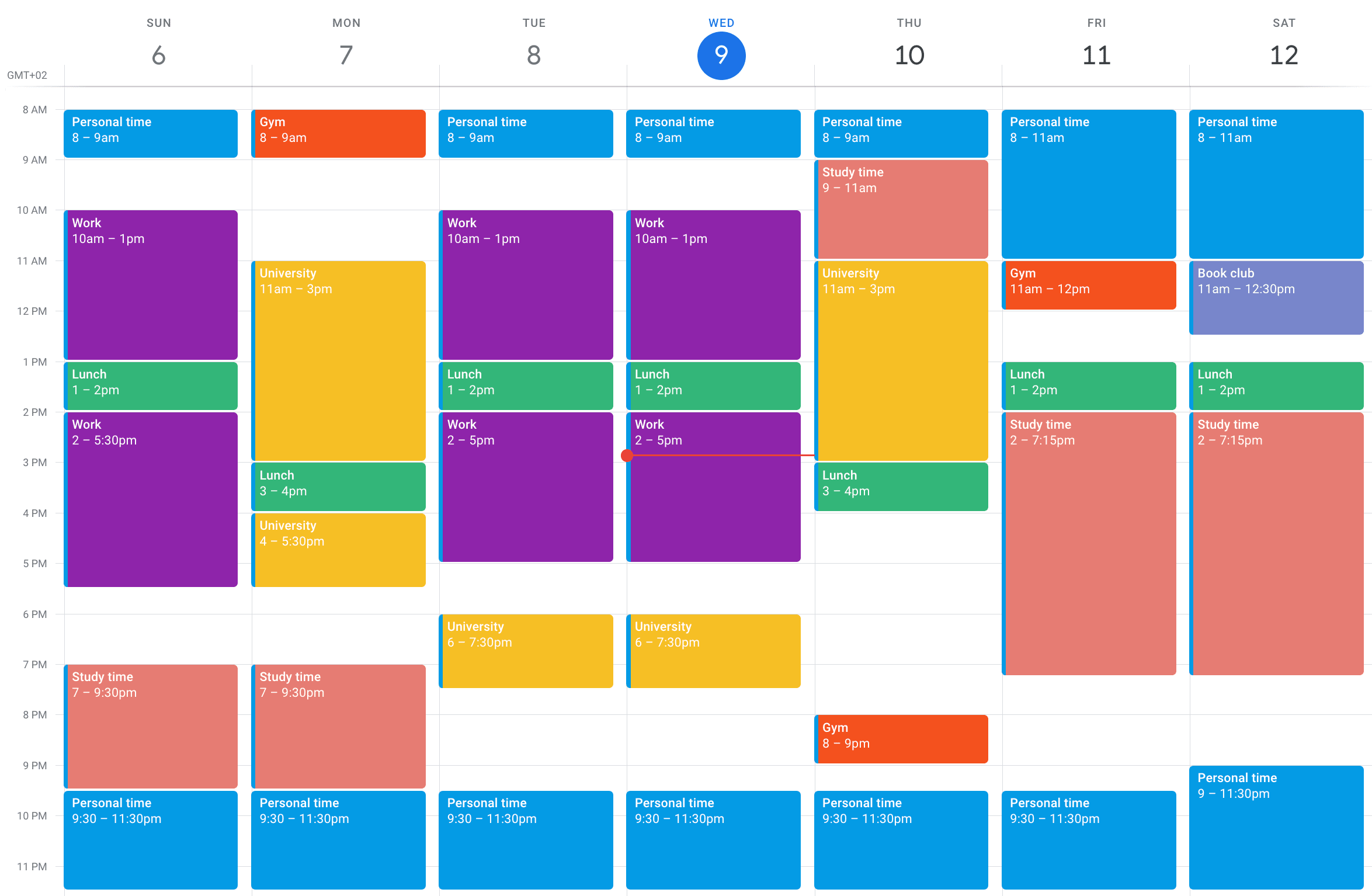Time Management for Students
Time management is an essential skill for college students - a good system allows you to successfully juggle all your classes, assignments and social life. In this guide, we'll cover practical tips for how to manage your time as a student.
- During Study Abroad

Time management is an essential skill for college students - a good system allows you to successfully juggle all your classes, assignments and social life. In this guide, we'll cover practical tips for how to manage your time as a student.
Struggling to manage your time?
Boost your productivity with our FREE task and time management templates!
Here are our favorite time management tips for college students.

Assess Priorities and Set Goals
To start learning time management skills for students, it's important to make a good plan. It will make your responsibilities feel more manageable, and you'll be able to keep yourself accountable. To start, follow these three core steps:
Step 1: Assess priorities and set clear goals
Identify priorities: Start by understanding what truly matters to you. Is it excelling at a particular subject, building relationships, or developing a new skill? Recognize these priorities and plan accordingly.
Set SMART goals: Once you identify what's important, it's time to establish some goals. Having specific and well-defined goals will give you direction and motivation. You can use the SMART model to craft effective and realistic time management goals for yourself. The acronym stands for Specific Measurable Achievable Relevant and Time-Specific.
Understand the big picture: Your goals should align with your broader life ambitions and academic path. Understanding how daily or weekly objectives fit into the long-term plan will help keep you focused and inspired.
Step 2: Collect all tasks and prioritize them
Use a planner: Whether a physical planner or a digital app, itä tracking tasks, deadlines, and appointments is essential.
Prioritize tasks: Not all tasks are equally important. Using methods like the Eisenhower Matrix, categorize tasks into urgent and important, important but not urgent, etc. This helps in determining what to tackle first. Our FREE Time Management for Students cheat-sheet can help you organize and prioritize your tasks.
Break down larger tasks: Students are often given large assignments that can seem daunting at first. To make them more manageable, break them into smaller parts and schedule time to complete each part. If you're not sure how long each task will take, try to recollect how much time it took you to complete similar tasks in the past, and use that as a guide for your future plans.
Step 3: Regularly review and update your list
Monitor progress: Continuously evaluate how you're doing in relation to your goals. Are you on track? What can be improved?
Adjust and refine goals: As you progress through the semester, your understanding of your capabilities and needs may change. Don't hesitate to modify your goals to better suit your evolving situation.
Stay aligned with your long-term aspirations: Regularly reassess your daily and weekly objectives to ensure they are still in alignment with your overarching ambitions and academic milestones.
Create a Schedule - Timeblocking
An effective technique for time management for students is timeblocking.
Timeblocking is the practice of planning out every moment of your day into sections or "blocks" of time, assigning specific tasks or activities to each block. It creates a visual representation of your day, helping you stay committed to your tasks and minimizing distractions.
Here's how to do it:
- Add time-sensitive events first: Important events and tasks that have to be completed at a very specific time (i.e. university lessons, dentist appointments or work) need to be added first. You can plan the rest of your day/week around these.
- Group tasks: Group tasks that are similar in nature together. For example, you can allocate a couple of hours a week for "admin work" - reviewing/planning your week, responding to emails, calling the doctor, booking appointments, and other similar tasks.
- Review and adjust: At the end of the day or week, review your schedule and adjust as necessary for future planning.
At the end the entire process, your calendar should look something like this:

💡 Pro tips:
Time management for students has to be more flexible than the average person's because your responsibilities and schedules may change every week. To achieve this, follow these guidelines:
- Set reasonable time durations for each task, considering the complexity and effort required.
- Avoid overloading your schedule, as it might lead to stress, burnout and inefficiency.
- Include breaks: Integrate breaks between time blocks to rest and recharge, and make sure to include some unscheduled free time for unforeseen events (or relaxation!).

Understand Why You Procrastinate
Did you know that 70-75% of students hit the snooze button when it comes to starting their academic activities?
One of the time management skills for students is understanding why you procrastinate. Here are some common reasons why students procrastinate, and how to overcome them:
| Reason for procrastination | How to overcome it |
| Lack of clarity and purpose | Having a clear sense of purpose and knowing why a task is essential can increase motivation and reduce the need to procrastinate. |
| Fear of failure | Recognize that failure is a natural part of the learning process, Focus on the effort put forth rather than solely on the outcome. Celebrate your progress, regardless of the results, and view each task as a chance to learn and grow. |
| Perfectionism | Accept that tasks may not always be completed perfectly, and that's okay. Adopt a "good enough" mindset, as progress is more important than perfection. |
| Lack of interest or motivation | Find ways to make tasks more enjoyable or rewarding. Incorporate elements of fun or creativity into the task, or create a reward system for completing specific milestones. |

Use Technology to Manage Your Time Effectively
Time management for students doesn't have to be boring! You can take advantage of various productivity apps to stay on top of your tasks.
These are some of the more popular ones:
Todoist
- Organize tasks into projects and set due dates with reminders.The app syncs across devices.
- Offers priority levels, labels, and filters.Has lots of integrations with 3rd party apps like Google Calendar, Microsoft Teams and Evernote.
- Free for the base option (which is more than enough for most students), but you can upgrade to the Pro version for $4/month.
Trello
- A visual approach to task management.
- The app uses boards, lists, and cards to represent tasks and their statuses, creating a clear and engaging overview.Allows for collaboration on group projects by sharing boards and assigning tasks to each other.
- Free for the base option (which is more than enough for individual students), but you can upgrade to the Standard plan for $5/month if you need more team features.
Note: Trello offers a discount to educational institutions, so your university may offer accounts! Make sure to check this.
Any.do
- Includes task management, calendar integration, and note-taking capabilities.
- The app's calendar offers seamless scheduling of deadlines and events.
- The note-taking function allows users to jot down ideas, lecture notes, or project details alongside their tasks.
- Free for the base option (which is more than enough for individual students), but you can upgrade to the Premium plan for $3/month if you need extra features like integrations, WhatsApp reminders and color tags.
Digital calendars
- Digital calendars allow you to color-code your schedule, set recurring events, and even receive reminders for upcoming tasks or classes.
- Another benefit of using the default app are integrations with your smart voice assistant, and other apps you use.
- Free for the default apps, but there may be paid options if you're using a third-party calendar.

Seek Support When Learning How to Manage Your Time as a Student
Remember, you're not alone on this college journey - you can learn how to manage your time as a student together with your peers!
Being around productive peers will motivate you to stay on top of your game. You can help each other stay organized and on track with assignments and deadlines. Plus, they offer a supportive environment where you can ask questions and clarify doubts. Time management for students has always been a popular topic of discussion.
Online forums and virtual study groups provide a platform for students to connect with peers from all over the world. Virtual discussions, sharing study materials, and collaborating via Discord, Reddit and similar platforms allows you to develop time management skills along with students from all over the world.
Listen to Your Body
Are you a morning person or a night owl? Discover your personal peak hours of productivity and make them work for you. Find your rhythm and allocate your most challenging tasks to those periods.
Experiment with different study techniques to find what works best for you. Whether it's short focused study bursts or long immersive sessions, embrace your unique style and maximize your brainpower.
Curious to know what kind of student you are? Our free 3-minute quiz will tell you what kind of study method suits you the best.

Don't Forget the Power of Self-Care
Remember that taking care of yourself is crucial for effective time management - especially for students. College life can be demanding, but neglecting self-care can lead to burnout and reduced productivity.
Make sure to include time in your schedule for relaxation, exercise, and hobbies that bring you joy. Taking breaks and getting enough sleep are essential for maintaining focus and cognitive function.
Prioritize your well-being by practicing mindfulness, engaging in activities that recharge you, and seeking support when needed. By incorporating self-care into your time management routine, you'll enhance your overall well-being and be better equipped to handle the demands of college life.

Author
Sara is the Content Designer at Keystone Academic Solutions, in charge of creating and curating content for students across the globe. Due to her background in UX and teaching, she's always in pursuit of new ways of presenting information more clearly.
Read related articles

Advice for Studying Abroad in Germany

Tips for Studying Abroad in the Netherlands
